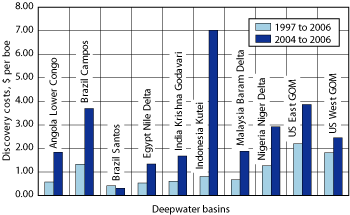Alan Murray, Wood Mackenzie
Discovery Cost (DC) is the exploration spend divided by the total new field resources discovered in a given period. Lower DC indicates more efficient exploration. In deepwater, we expect higher drilling costs to be offset by larger volumes.
DC is similar to the Finding Cost (FC) metric. DC is based on resources in the year in which they were discovered, whereas FC is based on reserves in the year in which they are proven and booked.
We looked at DC for all 10 deepwater basins, where over 1 billion boe was discovered between 1997 and 2006. We then compared these results to the average DC over the last three years to understand how costs are changing, and whether cost increases and basin maturity are having an impact on exploration efficiency.
Looking at the 10-yr average, DC is around $1 per boe for most basins. Deepwater has been similar to global DC over the same period, which averaged $1.20 per boe. The exception is the US GOM, where costs have been much higher because reservoirs are more deeply buried and often lie in ultra-deep water.
Over three years, there is a trend of higher DC. Only one basin bucks this trend: Brazil’s Santos Basin. The supergiant Tupi discovery in 2006 has huge volumes that more than offset its recent spend increases. One other basin where costs have not increased sharply is the West GOM’s emerging Paleogene play. Exploration here is extremely challenging and expensive, but large resource volumes keep unit costs reasonable. DC increased the most in Brazil’s Campos and Indonesia’s Kutei Basins.
If we exclude the Santos Basin, DC in deepwater has risen 120% to $2.46 per boe over the last three years from $1.12 per boe over the past 10 yr. The global average has risen 83% for the last three years to $2.20 per boe.
Going from low DC to high DC indicates the disproportionate impact that cost inflation has had on deepwater drillers.
Should explorers continue to invest in deepwater exploration? Acreage costs, fiscal terms and development costs have experienced rampant inflation as steep as the run-up in exploration costs. Our analysis suggests that full cycle returns in deepwater will continue to be attractive, provided that oil and gas prices remain strong. 
|



